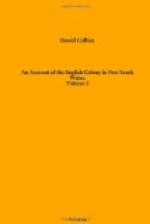This circumstance must impress upon the mind of every one who may read this account, to what a dreadful state of profligacy the colony had arrived, which, alarming as it was, must have been still worse, had it not been for the civil police which fortunately had been established; for a more wicked, abandoned, and irreligious set of people had never been brought together before in any part of the colony. The hope of their amendment seemed every day to lessen. The spirit of trade (not that liberal spirit which characterises the British trader, but a mean, selfish, avaricious passion, that hesitated not at any means to be gratified) proved the source of every evil under which the settlers laboured.
Notwithstanding this picture of their vices, the colony was at this time, generally speaking, in perfect health. For want of slop clothing and bedding, indeed, they were much distressed; but on this or any other account they were little deserving of any commiseration.
Since the last failure of those ill-considered attempts of the Irish to escape from the colony, no further schemes of that nature had been planned; but, as a matter of common justice to them, it was much wished that regular accounts of the dates of their conviction, and their several terms of transportation, might be sent out. They had been informed, that a promise to this effect had been made by government.
On the 7th, the two Americans, the Semiramis, and Argo schooner, sailed for China. At the same time the Nautilus brig, and Norfolk long-boat, sailed for Van Diemen’s land. The Nautilus, which had been in extreme distress for every kind of repair, was completely put in order here; and, as the two young men who had the care and direction of the speculation on which she was fitted out from India, had been very unfortunate through the infirmities of their vessel, and other causes, they were determined to try, during this season, what the seal-fishing among the islands to the southward might produce.
On the day following, the Francis sailed for Norfolk Island, with a few women and some stores for that settlement. As it was intended, that on her return she should examine the shoal said to have been discovered to the northward of Lord Howe Island, and make, if possible, and ascertain the situation of, the island discovered in 1788 by Lieutenant Shortland in the Alexander transport, and named by him Sir Charles Middleton island, Lieutenant John Shortland, of the Reliance, a son of the above officer, was sent in the Francis, and was charged with the sole direction of the vessel upon that service.
In the Norfolk were Lieutenant Flinders and Mr. Bass, who were instructed to examine the existence of the strait supposed to divide Van Diemen’s land from the continent.




